Corporate Social Responsibility: Theories, Frameworks, and Debates
VerifiedAdded on 2023/06/03
|8
|992
|159
Report
AI Summary
This report provides a comprehensive analysis of Corporate Social Responsibility (CSR), exploring key theories such as ethical perspectives and instrumental theories, illustrated by the Wells Fargo scandal. It delves into arguments and debates surrounding CSR, particularly the balance between stakeholder and shareholder needs, and emphasizes the benefits of managing CSR through diversity, social inclusion, and environmental sustainability. The report also examines corporate governance frameworks and their alignment with strategic CSR initiatives, highlighting the importance of accountability and equity value. The analysis draws upon various academic sources to provide a balanced view of CSR's role in modern business, offering valuable insights for students and professionals alike. Desklib provides access to similar solved assignments and past papers for students.
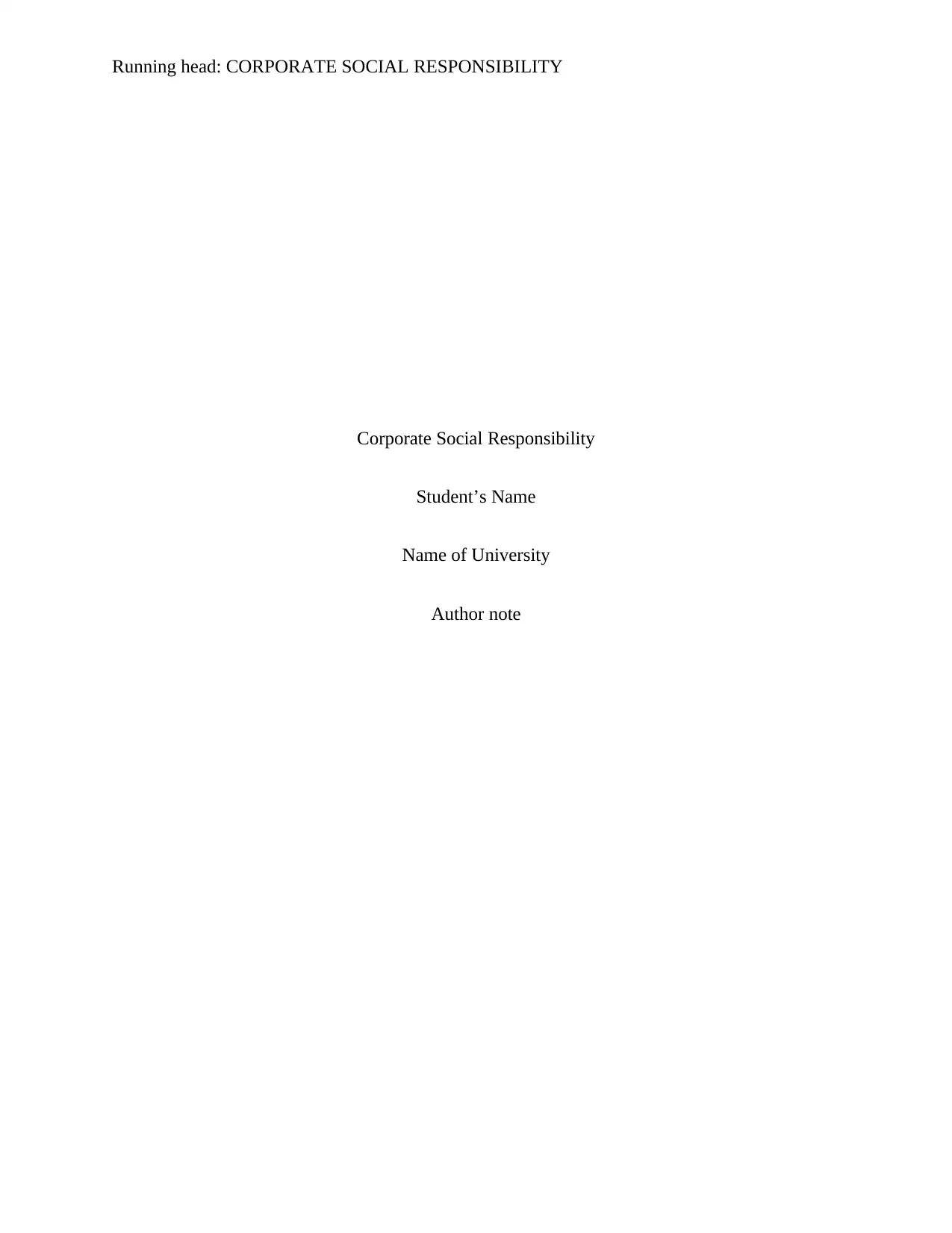
Running head: CORPORATE SOCIAL RESPONSIBILITY
Corporate Social Responsibility
Student’s Name
Name of University
Author note
Corporate Social Responsibility
Student’s Name
Name of University
Author note
Paraphrase This Document
Need a fresh take? Get an instant paraphrase of this document with our AI Paraphraser
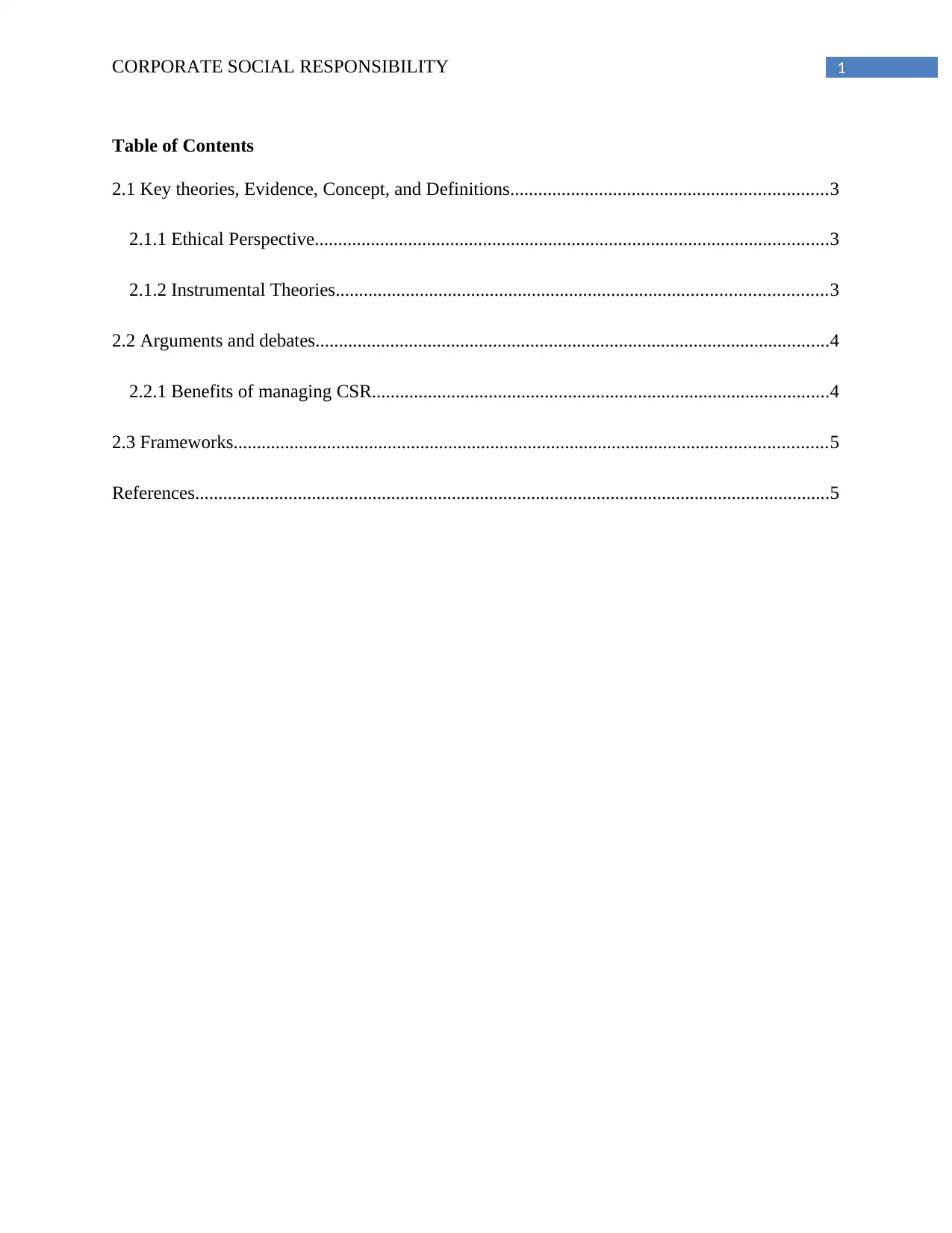
1CORPORATE SOCIAL RESPONSIBILITY
Table of Contents
2.1 Key theories, Evidence, Concept, and Definitions....................................................................3
2.1.1 Ethical Perspective..............................................................................................................3
2.1.2 Instrumental Theories.........................................................................................................3
2.2 Arguments and debates..............................................................................................................4
2.2.1 Benefits of managing CSR..................................................................................................4
2.3 Frameworks...............................................................................................................................5
References........................................................................................................................................5
Table of Contents
2.1 Key theories, Evidence, Concept, and Definitions....................................................................3
2.1.1 Ethical Perspective..............................................................................................................3
2.1.2 Instrumental Theories.........................................................................................................3
2.2 Arguments and debates..............................................................................................................4
2.2.1 Benefits of managing CSR..................................................................................................4
2.3 Frameworks...............................................................................................................................5
References........................................................................................................................................5
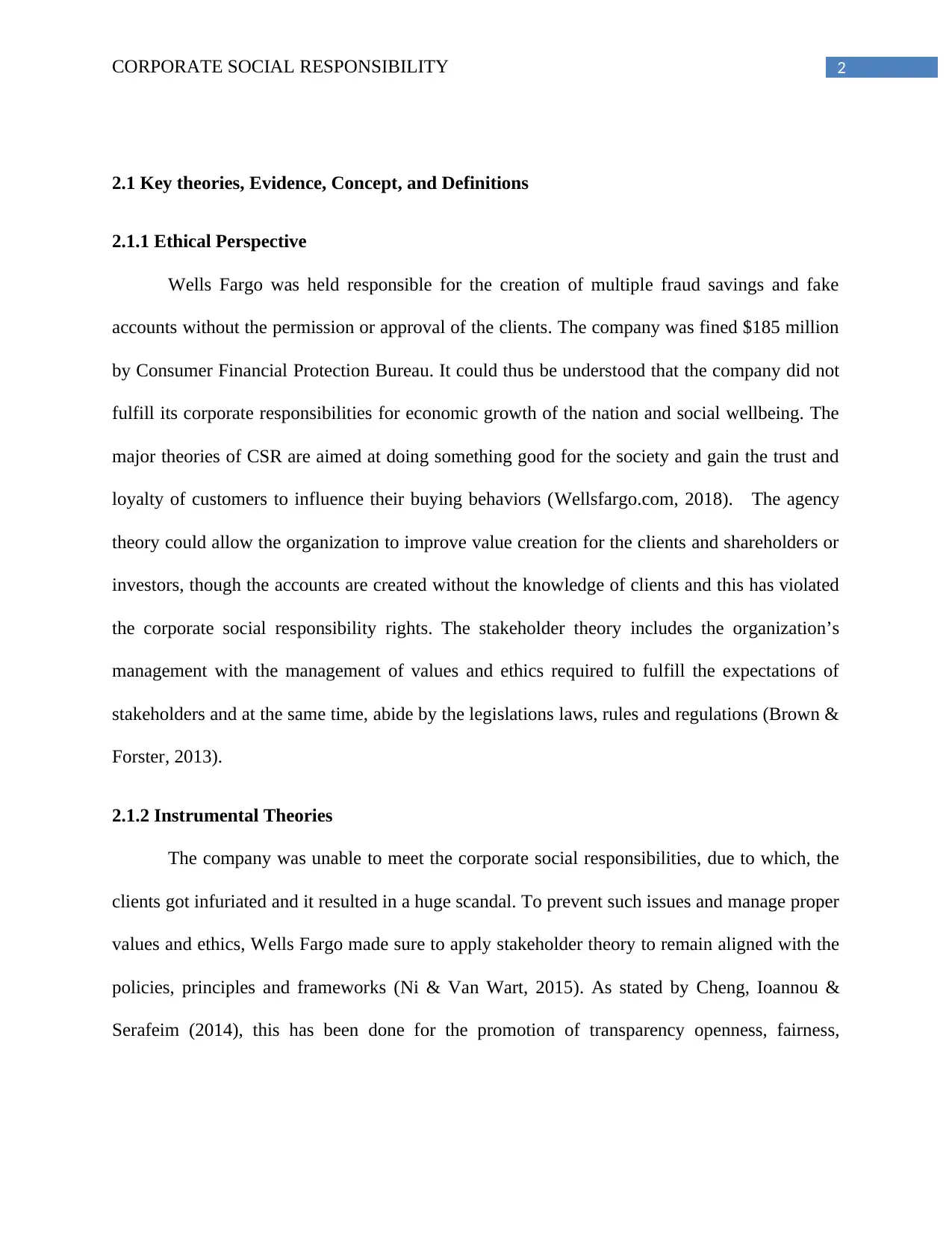
2CORPORATE SOCIAL RESPONSIBILITY
2.1 Key theories, Evidence, Concept, and Definitions
2.1.1 Ethical Perspective
Wells Fargo was held responsible for the creation of multiple fraud savings and fake
accounts without the permission or approval of the clients. The company was fined $185 million
by Consumer Financial Protection Bureau. It could thus be understood that the company did not
fulfill its corporate responsibilities for economic growth of the nation and social wellbeing. The
major theories of CSR are aimed at doing something good for the society and gain the trust and
loyalty of customers to influence their buying behaviors (Wellsfargo.com, 2018). The agency
theory could allow the organization to improve value creation for the clients and shareholders or
investors, though the accounts are created without the knowledge of clients and this has violated
the corporate social responsibility rights. The stakeholder theory includes the organization’s
management with the management of values and ethics required to fulfill the expectations of
stakeholders and at the same time, abide by the legislations laws, rules and regulations (Brown &
Forster, 2013).
2.1.2 Instrumental Theories
The company was unable to meet the corporate social responsibilities, due to which, the
clients got infuriated and it resulted in a huge scandal. To prevent such issues and manage proper
values and ethics, Wells Fargo made sure to apply stakeholder theory to remain aligned with the
policies, principles and frameworks (Ni & Van Wart, 2015). As stated by Cheng, Ioannou &
Serafeim (2014), this has been done for the promotion of transparency openness, fairness,
2.1 Key theories, Evidence, Concept, and Definitions
2.1.1 Ethical Perspective
Wells Fargo was held responsible for the creation of multiple fraud savings and fake
accounts without the permission or approval of the clients. The company was fined $185 million
by Consumer Financial Protection Bureau. It could thus be understood that the company did not
fulfill its corporate responsibilities for economic growth of the nation and social wellbeing. The
major theories of CSR are aimed at doing something good for the society and gain the trust and
loyalty of customers to influence their buying behaviors (Wellsfargo.com, 2018). The agency
theory could allow the organization to improve value creation for the clients and shareholders or
investors, though the accounts are created without the knowledge of clients and this has violated
the corporate social responsibility rights. The stakeholder theory includes the organization’s
management with the management of values and ethics required to fulfill the expectations of
stakeholders and at the same time, abide by the legislations laws, rules and regulations (Brown &
Forster, 2013).
2.1.2 Instrumental Theories
The company was unable to meet the corporate social responsibilities, due to which, the
clients got infuriated and it resulted in a huge scandal. To prevent such issues and manage proper
values and ethics, Wells Fargo made sure to apply stakeholder theory to remain aligned with the
policies, principles and frameworks (Ni & Van Wart, 2015). As stated by Cheng, Ioannou &
Serafeim (2014), this has been done for the promotion of transparency openness, fairness,
⊘ This is a preview!⊘
Do you want full access?
Subscribe today to unlock all pages.

Trusted by 1+ million students worldwide
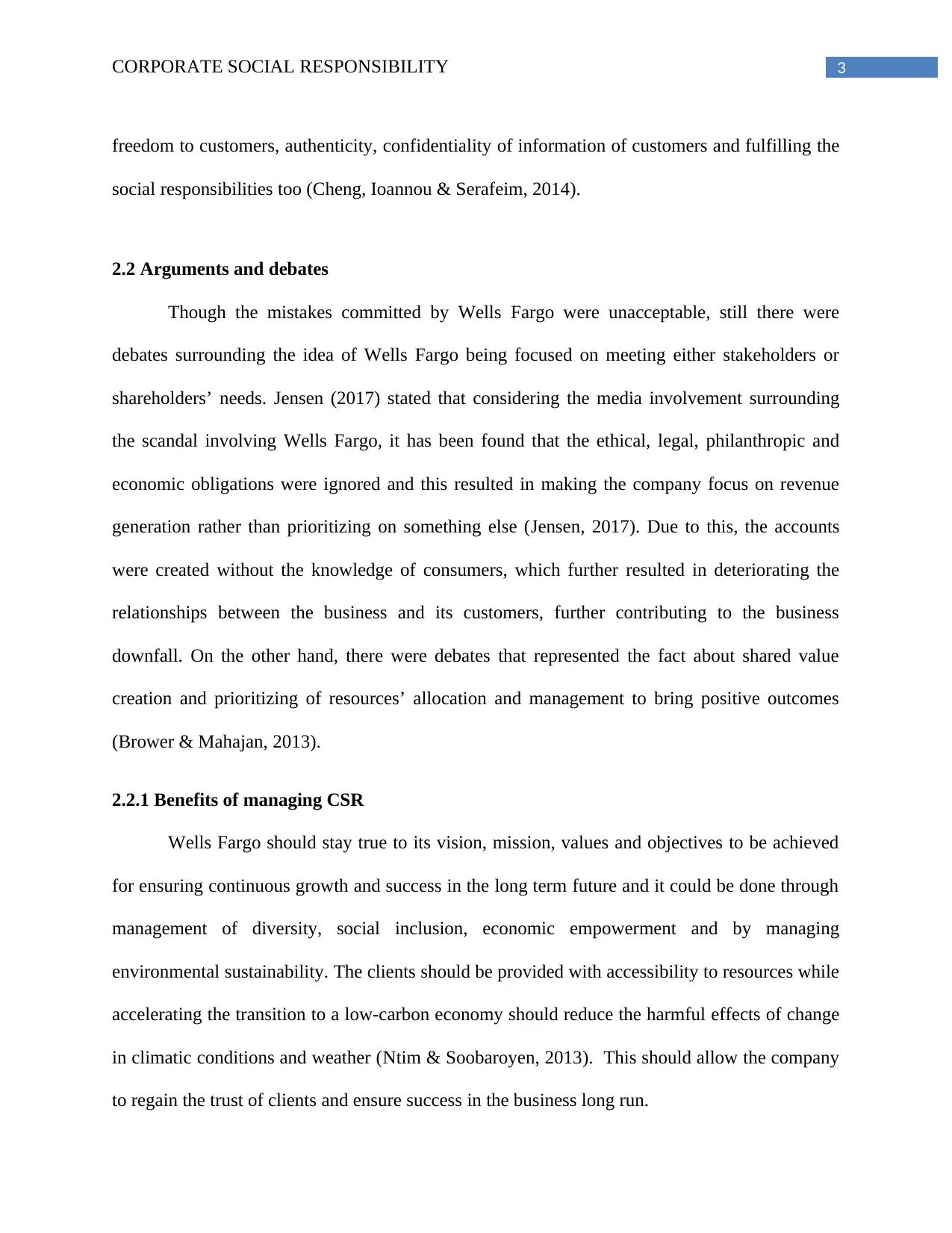
3CORPORATE SOCIAL RESPONSIBILITY
freedom to customers, authenticity, confidentiality of information of customers and fulfilling the
social responsibilities too (Cheng, Ioannou & Serafeim, 2014).
2.2 Arguments and debates
Though the mistakes committed by Wells Fargo were unacceptable, still there were
debates surrounding the idea of Wells Fargo being focused on meeting either stakeholders or
shareholders’ needs. Jensen (2017) stated that considering the media involvement surrounding
the scandal involving Wells Fargo, it has been found that the ethical, legal, philanthropic and
economic obligations were ignored and this resulted in making the company focus on revenue
generation rather than prioritizing on something else (Jensen, 2017). Due to this, the accounts
were created without the knowledge of consumers, which further resulted in deteriorating the
relationships between the business and its customers, further contributing to the business
downfall. On the other hand, there were debates that represented the fact about shared value
creation and prioritizing of resources’ allocation and management to bring positive outcomes
(Brower & Mahajan, 2013).
2.2.1 Benefits of managing CSR
Wells Fargo should stay true to its vision, mission, values and objectives to be achieved
for ensuring continuous growth and success in the long term future and it could be done through
management of diversity, social inclusion, economic empowerment and by managing
environmental sustainability. The clients should be provided with accessibility to resources while
accelerating the transition to a low-carbon economy should reduce the harmful effects of change
in climatic conditions and weather (Ntim & Soobaroyen, 2013). This should allow the company
to regain the trust of clients and ensure success in the business long run.
freedom to customers, authenticity, confidentiality of information of customers and fulfilling the
social responsibilities too (Cheng, Ioannou & Serafeim, 2014).
2.2 Arguments and debates
Though the mistakes committed by Wells Fargo were unacceptable, still there were
debates surrounding the idea of Wells Fargo being focused on meeting either stakeholders or
shareholders’ needs. Jensen (2017) stated that considering the media involvement surrounding
the scandal involving Wells Fargo, it has been found that the ethical, legal, philanthropic and
economic obligations were ignored and this resulted in making the company focus on revenue
generation rather than prioritizing on something else (Jensen, 2017). Due to this, the accounts
were created without the knowledge of consumers, which further resulted in deteriorating the
relationships between the business and its customers, further contributing to the business
downfall. On the other hand, there were debates that represented the fact about shared value
creation and prioritizing of resources’ allocation and management to bring positive outcomes
(Brower & Mahajan, 2013).
2.2.1 Benefits of managing CSR
Wells Fargo should stay true to its vision, mission, values and objectives to be achieved
for ensuring continuous growth and success in the long term future and it could be done through
management of diversity, social inclusion, economic empowerment and by managing
environmental sustainability. The clients should be provided with accessibility to resources while
accelerating the transition to a low-carbon economy should reduce the harmful effects of change
in climatic conditions and weather (Ntim & Soobaroyen, 2013). This should allow the company
to regain the trust of clients and ensure success in the business long run.
Paraphrase This Document
Need a fresh take? Get an instant paraphrase of this document with our AI Paraphraser
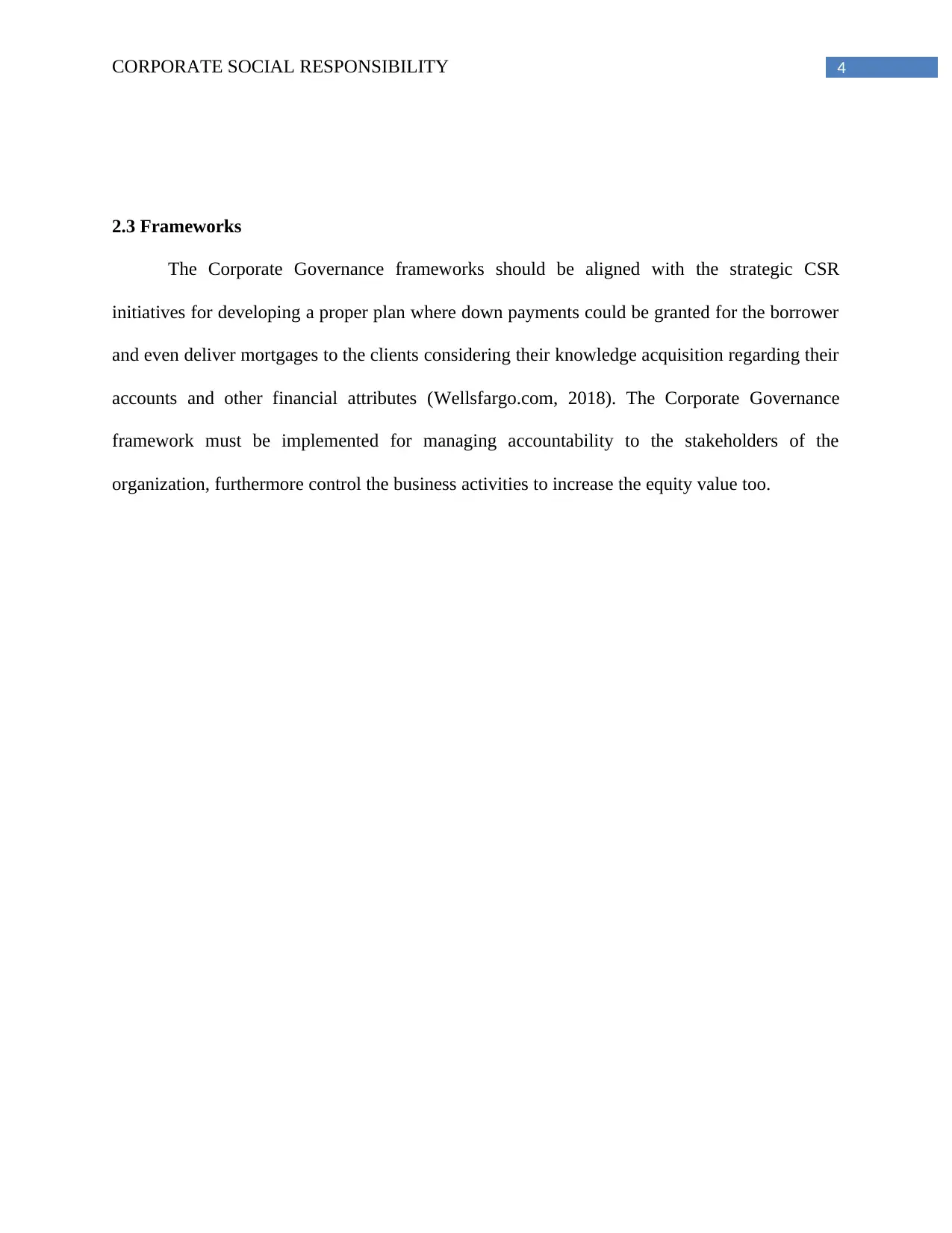
4CORPORATE SOCIAL RESPONSIBILITY
2.3 Frameworks
The Corporate Governance frameworks should be aligned with the strategic CSR
initiatives for developing a proper plan where down payments could be granted for the borrower
and even deliver mortgages to the clients considering their knowledge acquisition regarding their
accounts and other financial attributes (Wellsfargo.com, 2018). The Corporate Governance
framework must be implemented for managing accountability to the stakeholders of the
organization, furthermore control the business activities to increase the equity value too.
2.3 Frameworks
The Corporate Governance frameworks should be aligned with the strategic CSR
initiatives for developing a proper plan where down payments could be granted for the borrower
and even deliver mortgages to the clients considering their knowledge acquisition regarding their
accounts and other financial attributes (Wellsfargo.com, 2018). The Corporate Governance
framework must be implemented for managing accountability to the stakeholders of the
organization, furthermore control the business activities to increase the equity value too.
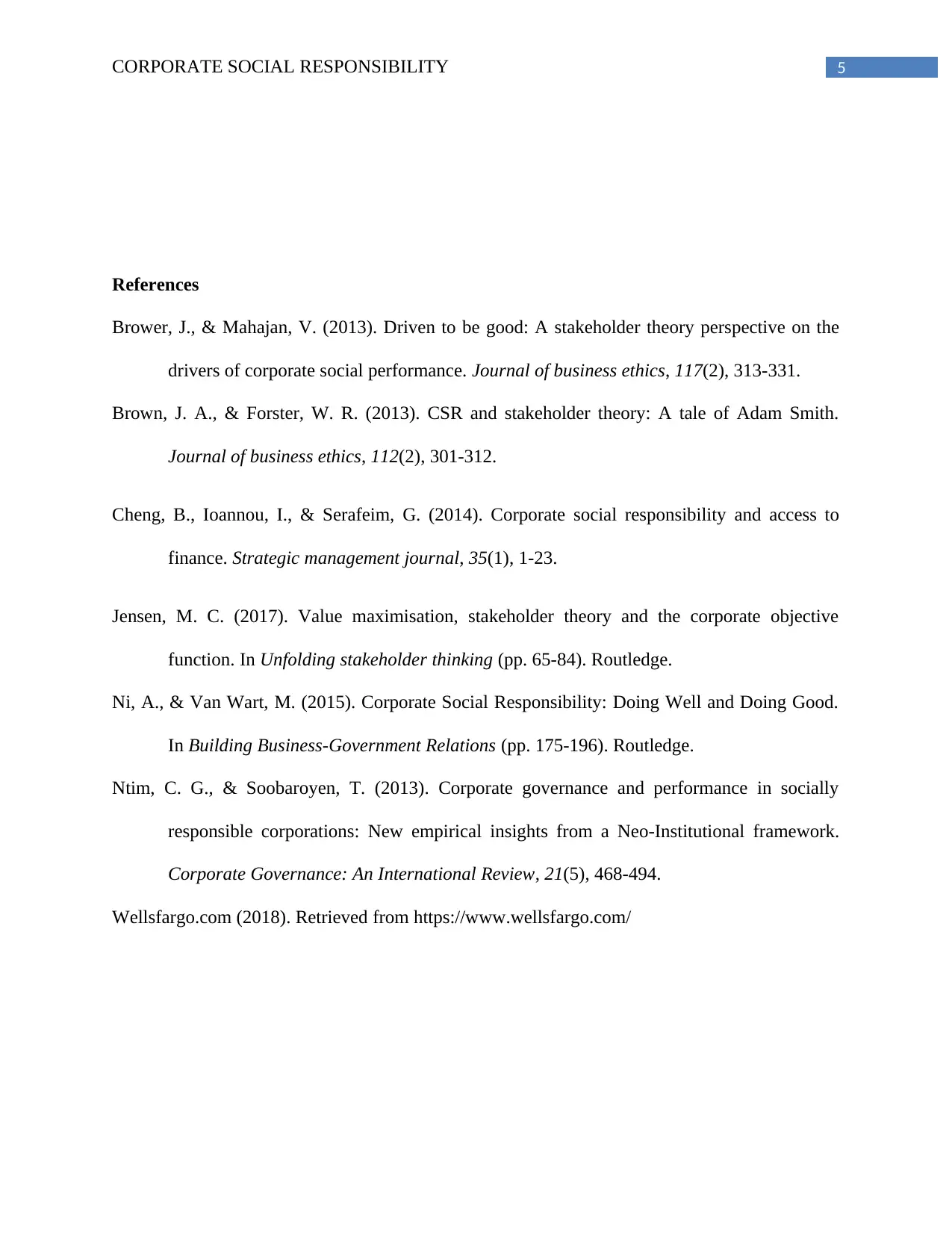
5CORPORATE SOCIAL RESPONSIBILITY
References
Brower, J., & Mahajan, V. (2013). Driven to be good: A stakeholder theory perspective on the
drivers of corporate social performance. Journal of business ethics, 117(2), 313-331.
Brown, J. A., & Forster, W. R. (2013). CSR and stakeholder theory: A tale of Adam Smith.
Journal of business ethics, 112(2), 301-312.
Cheng, B., Ioannou, I., & Serafeim, G. (2014). Corporate social responsibility and access to
finance. Strategic management journal, 35(1), 1-23.
Jensen, M. C. (2017). Value maximisation, stakeholder theory and the corporate objective
function. In Unfolding stakeholder thinking (pp. 65-84). Routledge.
Ni, A., & Van Wart, M. (2015). Corporate Social Responsibility: Doing Well and Doing Good.
In Building Business-Government Relations (pp. 175-196). Routledge.
Ntim, C. G., & Soobaroyen, T. (2013). Corporate governance and performance in socially
responsible corporations: New empirical insights from a Neo‐Institutional framework.
Corporate Governance: An International Review, 21(5), 468-494.
Wellsfargo.com (2018). Retrieved from https://www.wellsfargo.com/
References
Brower, J., & Mahajan, V. (2013). Driven to be good: A stakeholder theory perspective on the
drivers of corporate social performance. Journal of business ethics, 117(2), 313-331.
Brown, J. A., & Forster, W. R. (2013). CSR and stakeholder theory: A tale of Adam Smith.
Journal of business ethics, 112(2), 301-312.
Cheng, B., Ioannou, I., & Serafeim, G. (2014). Corporate social responsibility and access to
finance. Strategic management journal, 35(1), 1-23.
Jensen, M. C. (2017). Value maximisation, stakeholder theory and the corporate objective
function. In Unfolding stakeholder thinking (pp. 65-84). Routledge.
Ni, A., & Van Wart, M. (2015). Corporate Social Responsibility: Doing Well and Doing Good.
In Building Business-Government Relations (pp. 175-196). Routledge.
Ntim, C. G., & Soobaroyen, T. (2013). Corporate governance and performance in socially
responsible corporations: New empirical insights from a Neo‐Institutional framework.
Corporate Governance: An International Review, 21(5), 468-494.
Wellsfargo.com (2018). Retrieved from https://www.wellsfargo.com/
⊘ This is a preview!⊘
Do you want full access?
Subscribe today to unlock all pages.

Trusted by 1+ million students worldwide
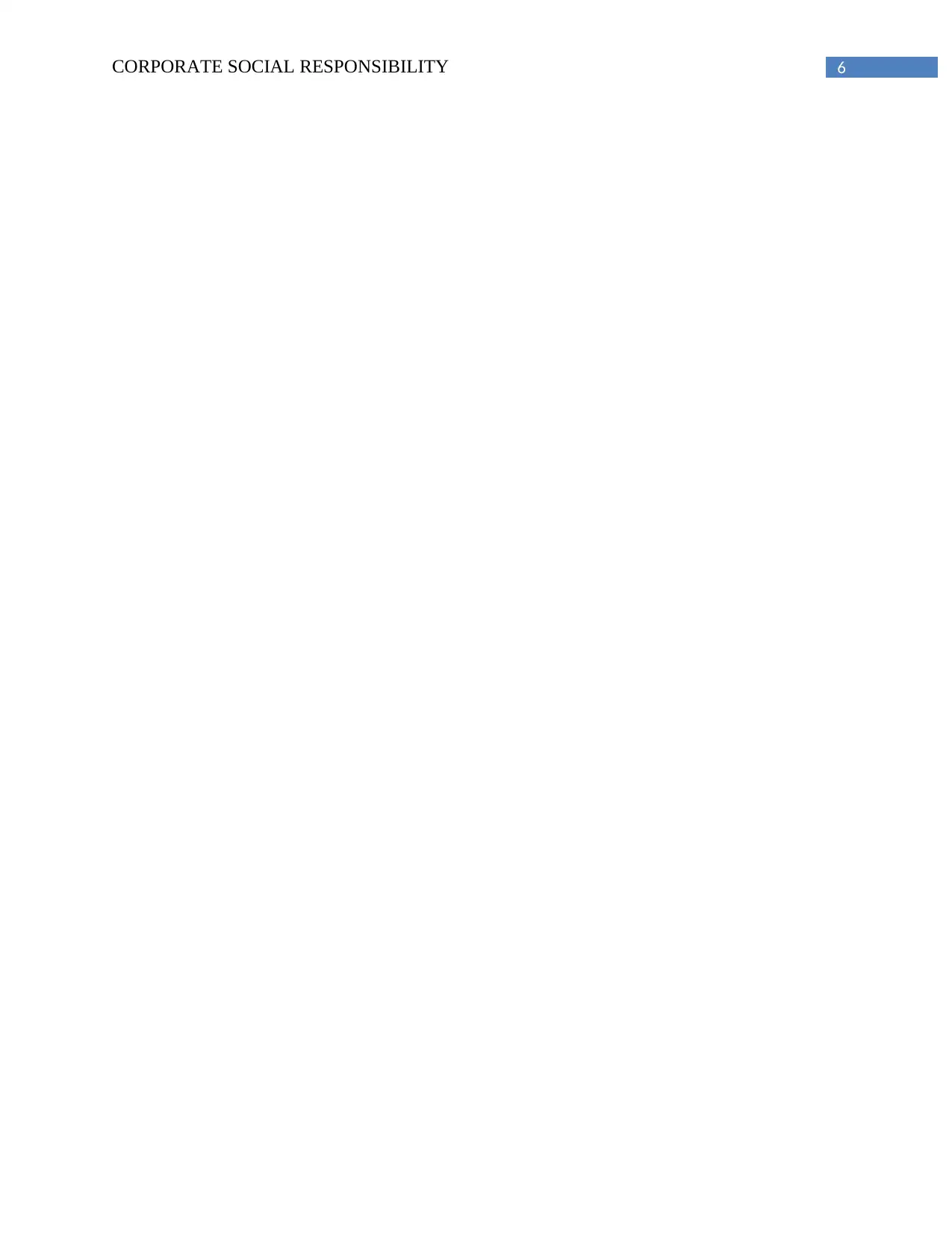
6CORPORATE SOCIAL RESPONSIBILITY
Paraphrase This Document
Need a fresh take? Get an instant paraphrase of this document with our AI Paraphraser
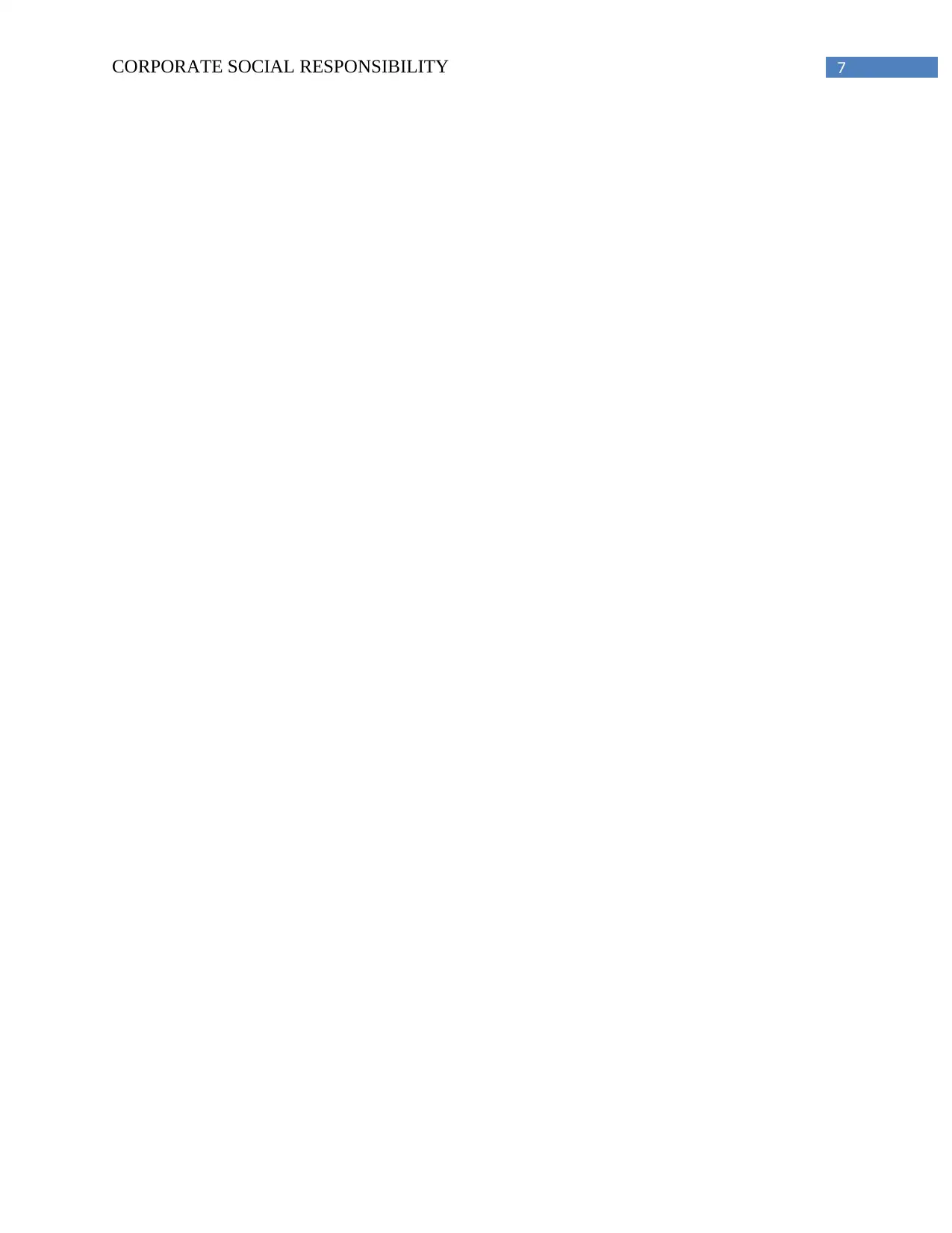
7CORPORATE SOCIAL RESPONSIBILITY
1 out of 8
Related Documents
Your All-in-One AI-Powered Toolkit for Academic Success.
+13062052269
info@desklib.com
Available 24*7 on WhatsApp / Email
![[object Object]](/_next/static/media/star-bottom.7253800d.svg)
Unlock your academic potential
Copyright © 2020–2026 A2Z Services. All Rights Reserved. Developed and managed by ZUCOL.




